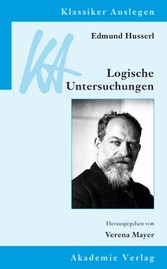
Edmund Husserl: Logische Untersuchungen (Klassiker auslegen, Band 35)
von: Verena Mayer, Christopher Erhard
De Gruyter Akademie Forschung, 2008
ISBN: 9783050050133
Sprache: Deutsch
260 Seiten, Download: 1144 KB
Format: PDF, auch als Online-Lesen
Robert Hanna
Husserl’s Arguments against Logical Psychologism
(Prolegomena, §§ 17–61) (S. 27-28)
3.1. Introduction
According to Edmund Husserl in the Prolegomena to Pure Logic, which constitutes the preliminary rational foundation for – and also the entire first volume of – his Logical Investigations, pure logic is the a priori theoretical, nomological science of „demonstration“ (LI 1, 57, Hua XVIII, 23). For him, demonstration includes both consequence and provability. Consequence is the defining property of all and only formally valid arguments, i. e., arguments that cannot lead from true premises to false conclusions. And provability (a. k. a. „completeness“) is the property of a logical system such that, for every truth of logic in that system, there is, at least in principle, a rigorous step-by-step logically valid procedure demonstrating its validity according to strictly universal, ideal, and necessary logical laws. In this way, the laws of pure logic completely determine its internal structure. Moreover, these laws and these proofs are all knowable a priori, with selfevident insight (LI 1, 196, Hua XVIII, 185–195).
So not only is pure logic independent of any other theoretical science, in that it requires no other science in order to ground its core notion of demonstration, it also provides both epistemic and semantic foundations for every other theoretical science, as well as every practical discipline or „technology.“ To the extent that pure logic is the foundation of every other theoretical science, it is the „theory of science“ (Wissenschaftslehre) in Bolzano’s sense of that term (LI 1, 60, Hua XVIII, 27), the „science which deals with the ideal essence of science as such“ (LI 1, 236, Hua XVIII, 244), and thus the science of science.
Logical Psychologism, or LP, is a particularly strong version of the denial that pure logic is an independent and absolutely foundational science. LP was a widely held view in the second half of the 19th century, grew out of the neo-Kantian and neo-Hegelian traditions alike, and is closely associated with the origins of empirical psychology as an autonomous discipline (Kusch 1995). Husserl’s arguments against LP in chapters 1–8 of the Prologemena, often referred to simply as Husserl’s „refutation“ of LP, constitute one of the most famous and broadly influential critical set pieces in 20th century philosophy, comparable in these respects to W. V. O. Quine’s attack on the analytic-synthetic distinction in Two Dogmas of Empiricism published almost exactly fifty years after the Prolegomena. In this connection, it is surely by no means a historical or philosophical accident that the original working title of another one of Quine’s famous and closely-related essays from the same period was Epistemology Naturalized: Or, the Case for Psychologism (Kusch 1995, 11). By the 1950s, psychologism was making a serious comeback in epistemology, if not in the philosophy of logic. But radically unlike Quine’s seminal papers (Quine 1961, Quine 1969, Quine 1976a, Quine 1976b), which are still widely read, studied, and taught in contemporary North American and European departments of philosophy, Husserl’s Prolegomena nowadays is rarely read or studied, and even more rarely taught. To the extent that the debate between LP and anti-psychologism is still an issue, it is the logico-philosophical writings of Gottlob Frege that are taken as the seminal texts on anti-psycholgism.








